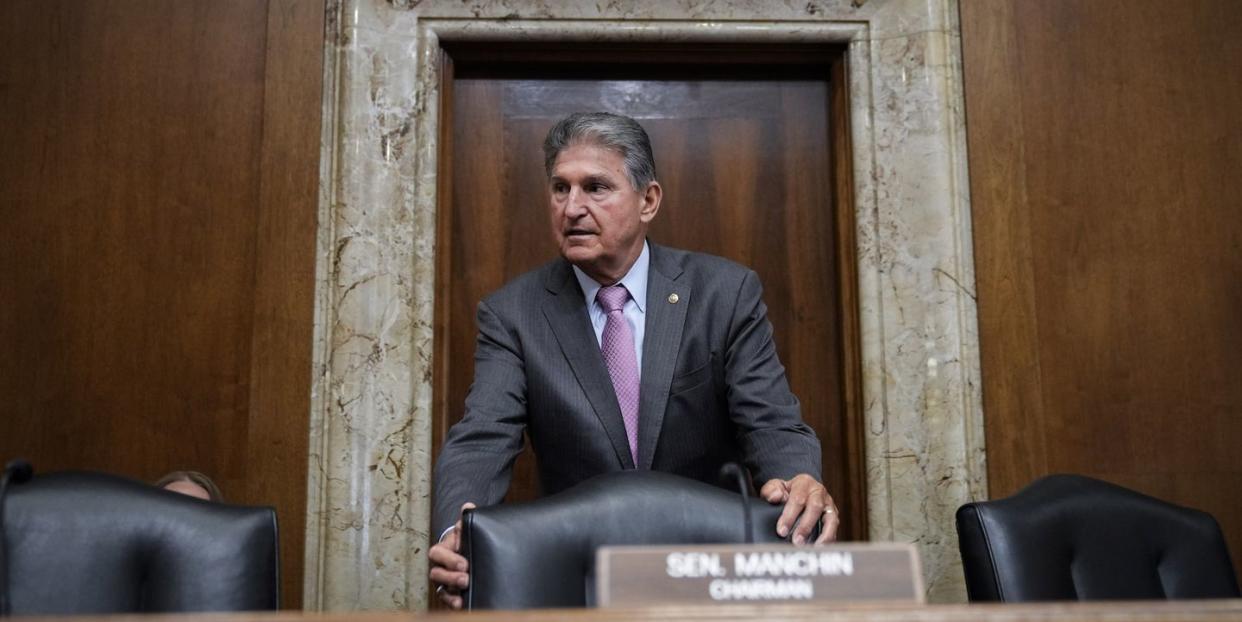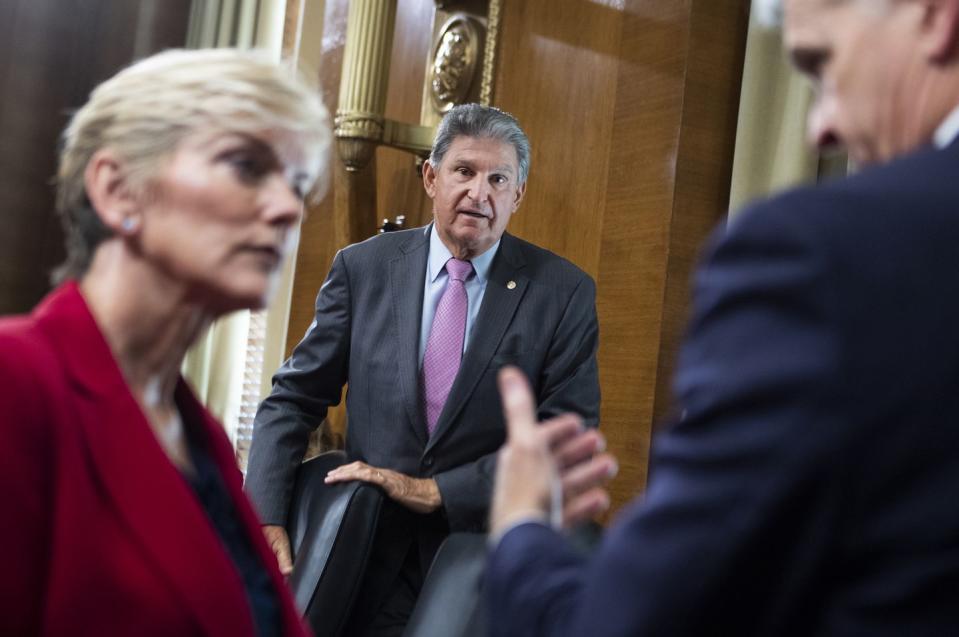Joe Manchin Brought the Fight to Preserve Democracy Back From the Dead. Will He Finish the Job?

- Oops!Something went wrong.Please try again later.
- Oops!Something went wrong.Please try again later.
"The history books might actually say that Joe Manchin saved democracy after all," Josh Silver of Represent.Us told me last Thursday. "Because until yesterday, it appeared they would say the opposite."
The senior senator from West Virginia seemed to upend the chess board last Wednesday with a memo to other Democratic lawmakers outlining which provisions of the For the People Act he could support, and which he could not. This was progress from his original position: that he was against S. 1—the Senate equivalent of H.R. 1—on the basis that it did not have bipartisan support, which in the current climate applies to any major piece of legislation that the Biden White House declares a priority. (Senate Republican leader Mitch McConnell has explicitly said this.) Now, following a meeting with civil-rights leaders and a larger pressure campaign from activists and, among others, the nation's largest coal miners' union, he is dealing in policy rather than the aesthetics of bipartisanship. Well, kinda. He still wants a bipartisan bill, and does not seem to have budged on his determination to protect the filibuster. (Neither, it seems, has Kyrsten Sinema.) In fact, Manchin seems to be working overtime behind the scenes to keep it in place, though reform—as long as it meets the Manchin branding of strengthening the mechanism—may still be on the table.
But in the meantime, he has staked out some provisions of the For the People Act that he's interested in. Among others, Manchin backs proposals to:
Make election day a public holiday
Mandate at least 15 consecutive days of early voting for federal elections (including two weekends)
Ban partisan gerrymandering "and use computer models"
Automatic registration through the DMV, with an option to opt out
These are some of the most critical provisions in the current climate. Getting all citizens easy access to the vote, and letting them pick their representatives rather than allowing politicians to pick their voters by rigging the redistricting process, are quite high on the list indeed. While Manchin shied away somewhat from the For the People Act's anti-corruption proposals—though he does back enhanced disclosure requirements for political spending—it's this kind of thing that was enough to earn Stacey Abrams's stamp of approval. And Barack Obama's.

It also earned some praise from Colorado Secretary of State Jena Griswold, who chairs the Democratic Association of Secretaries of State. "Some of the provisions not in Manchin's list that I think are crucial are election day registration, absentee voting, restoration of the voting rights of people with past felonies, stopping discriminatory voter purges," she said in a phone call last week. "But again, I think we're going in the right direction."
Congressman John Sarbanes, the original sponsor of H.R. 1, was similarly upbeat: "As Senator Manchin said, 'Inaction is not an option. That's our mantra in the weeks ahead. I look forward to working with leaders in our caucus to bring the For the People Act across the finish line."
There are some Manchin proposals that have garnered less enthusiasm from Democrats and their activist allies, including his backing of voter-ID requirements and (possibly) the kinds of purges of state voter rolls that have become more prominent over the last decade. However, as Silver pointed out, the scholarship on the subject has raised questions about just how damaging voter-ID laws are in practice. Also, Manchin's proposal allows for more flexibility for voters trying to prove their eligibility. They could, in his framework, use a utility bill with their name and address, which would cut down on the opportunity cost of seeking an ID. Moreover, the voter-rolls language Manchin used was not particularly definitive, and as Secretary of State Griswold put it: "Having clean voter rolls is important. Keeping voter rolls up to date is important, it saves money, it ensures ballots are going to the right spot." It's targeting specific voters along racial or class lines for purging that leads to corrupt elections, which Manchin's language doesn't particularly point towards:
"Allow for maintenance of voter rolls by utilizing information derived from state and federal documents."
And that uncertainty is kind of a theme here. "The voter purge stuff looks quite concerning to us, but again, it's such a sausage-making operation," said Silver of Represent.Us, which has long backed an election reform framework that is in aggregate quite similar to the original H.R. 1. "There's so much dynamism to what's happening right now with this bill, that it would be a mistake to read too much into the policy details right now. If we can get through cloture, and we can get to the next stage, that's when this becomes relevant." The bill needs to get proper consideration in the Senate before Silver or anyone else can weigh in on particular provisions.
For unlimited access to Esquire's political coverage, including an exclusive weekly newsletter from Charles P. Pierce, you can join Esquire Select here.
That's what's on the docket now. On Tuesday, Senate Majority Leader Chuck Schumer will bring S. 1, the For the People Act to the floor for a vote on whether the legislature's upper chamber will begin debate on the topic. This will not be a vote to pass the bill, just to discuss the proposal. And it will almost certainly be blocked by Republicans, who are not interested in any discussions on voting rights, even on the compromise proposals proposed by Manchin. His framework almost certainly does not go far enough in addressing the erosion of American democratic institutions in the current moment, particularly the ongoing push in Republican-controlled state legislatures to make it easier to overturn future results they don't like based on phony allegations of fraud. It's not just the "audits" in Arizona and beyond; some legislatures are trying to seize control of the election administration process, and some candidates running to be the chief election officials in various states are pushing the Big Lie about the last contest. "If members of the Senate and Congress do not feel this is one of the most urgent moments in American history," Griswold said, "then they're not paying attention."
In the end, the weight of all this will very likely land on Manchin's desk—and Sinema's, if the Arizona senator continues to insist there can be no bill protecting voting rights without the votes of 10 Republicans, who are members of the party that is attacking voting rights. Previously, Manchin backed the John Lewis Voting Rights Act as an alternative to the For the People Act, but it seems someone has communicated the differences between them—and why the former is insufficient to the moment—in the meantime. (This did not stop Manchin from suggesting some changes to the new VRA that some experts say weaken the bill. Also, Senate Republicans oppose that bill, too.) In the end, he will need to grapple with the fact that one of our two major political parties has chosen to wield the mechanisms of democracy against American voters in order to entrench their own power rather than attempt to win the support of a majority of those voters. "Joe Manchin signaled he may actually choose democracy over autocracy after all," Silver said. That remains to be seen, somewhere on the other side of a whole lot of sausage-making.
You Might Also Like

